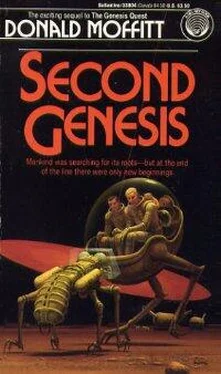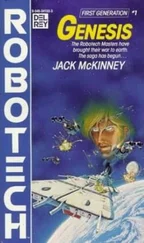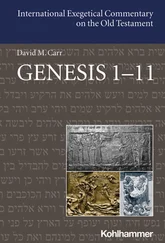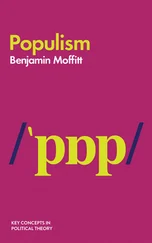The datanet reporter waved for attention. “Couldn’t the Cuddlies be descended from some other primate? Weren’t there things like monkeys and apes? Lemurs?”
Ame shook her head. “We know the Cuddlies are hominids from the comparative anatomy studies—the teeth, for instance. But more important is the amino acid and protein sequencing. Molecular analysis shows that Cuddlies are as far removed from apes and monkeys as humans are. The cytochrome c sequence in man and Cuddly is almost identical.” She paused, got some encouragement from Doc Pol, who was sitting behind her, and continued. “And there is no immunological distance at all.”
“Is that why Cuddlies were able to catch the immortality virus?” asked someone else, probably a Cuddly owner.
“Yes,” Ame said. “They’re our very close cousins. They’re what we could become.”
At the back of the auditorium, Jun Davd turned to Bram with an amused smile. “How does it feel, Bram? You brought us across thirty-seven million light-years, hoping to find Original Man, and when we found him, we made him our house pet.”
“We’re Original Man, though, aren’t we, in a sense?” Bram said. “And if you want to look at it the way Ame just did, he’s descended from us.”
The datanet reporter persisted in his questions. “Are you saying that we’re going to evolve into little furry animals like Cuddlies, then?”
“No,” Ame said. “Evolution doesn’t repeat itself. We still have a long way to go. And so have they.”
The Large Magellanic Cloud lay before them, a ruddy tiara spread across the night. From only a few tens of thousands of light-years away, it was brilliant, the teeming stars laced with torches of red fire.
“It’s lovely,” Mim said, holding Bram’s hand. “What a breathtaking sky we’re going to live under.”
“Yes, the skies will be spectacular,” Jun Davd said. “That red nebula at the end—the Tarantula, Original Man called it—will be brighter than Earth’s full moon. And of course the Milky Way will be huge, and we’ll see it almost head on. It will fill half the night sky—almost as large as we’re seeing it now.”
He switched on the rearward view for a moment to show them what he meant. The heartbreaking swirl of humankind’s birthplace blazed against the darkness, a splendid pinwheel that revealed nothing of the deadly mill that was churning within her.
Bram felt the ache of its loss. “We’ll be able to keep watch over it,” he said with a smile he hoped was on straight.
“Don’t look so glum,” Jao boomed. “Not a dragonfly click coming from it, and it’s been a hundred thousand years.”
They had been fleeing for twenty-two years, ship time, and three years previously the dragonfly radio emissions had ceased—almost abruptly because of the extreme temporal condensation of the gamma factor they had built up by then. It meant that the dragonfly civilization had ceased to exist some ten to twenty thousand years after they had departed the galaxy and that, after a hundred thousand years, there was still no sign of it. For the first year of those three, Bram had lived in terror that one day Trist’s listening post would pick up the clicking sounds that would mean that somewhere a dragonfly planet had survived and struggled back to the technological level again.
“You’re right,” he said with returning cheer. “It’s the Cuddlies’ turn now, on their diskworlds. They’ve got twenty-six million years to make the most of their opportunity. And who knows—before their time is up, we may even learn how to shut off galactic dynamos. In that case, we could go back and save them.”
“Oh, Bram,” Mim said. “What a wonderful thought!”
“But crazy,” Jao said. “A crazy dream.”
“Yes,” Bram said. “I’ve been told that before.”
Jun Davd switched on the forward view again. The torches of the Large Cloud shone forth once more. “We’ll be safe in there,” he said. “You can see there’s no hypermass giving it shape. There are fifteen billion stars in there—old, young, and in-between. We ought to be able to find one small yellow star that the human race can call home.”
“Amen to that,” Bram said.
He smiled at Mim and squeezed the hand clasping his. Methuselah pressed against his leg. Humans and posthumans drew closer together to share an ancient tribal comfort. They stood in sacramental silence as the living tree that bore them hurtled out of the dark toward the cloud of fire.
“Why am I different?” the little decapod said.
He was about rib-high to Bram, hardly out of babyhood, his saucer eyes disproportionately large around his waist, the undersides of his stubby tentacles still an immature mauve. Theth-theth, Bram had named him when the time had come to fish him out of the nursery pool. In the Small Language, it was a derivative of Voth. Mim had suggested the name: Little Theth.
Bram laughed and ruffled the velvety inner surface of a tentacle. He could feel the words that were trying to take shape there, gaining in form and lucidity with every passing day.
“Because I’m made of human stuff and you’re made of Nar stuff,” he said tolerantly. “We’ve been through it before.”
“Just one more time,” the small being begged.
“You want me to tell you the Story,” Bram said.
“Yes,” Theth-theth said contentedly, and snuggled up against Bram. Methuselah, trying to insert himself into the group, nestled against the little decapod’s other side, making a sandwich of him, and Theth-theth stroked him with a lazy tentacle.
Bram sighed and settled back against the thick bole of the oak tree. There were oak trees now—whole forests of them—and this one was over a hundred years old. It had been planted, he remembered, the very day the bio-project to resurrect the Nar had begun.
He looked out across the wide valley, green with the grass and trees of Earth that had taken root here and flourished. A stream ran down the slopes, sparkling silver, and he could see a herd of zebra pausing to drink at one of the wide pools. The air was alive with the songs of birds.
Haven was a fair world, its contours softened by weather but barren of life until the coming of humanity. Now, after more than a century, the green cloak of vegetation was beginning to spread across the blue oceans to the other continents, and the oceans themselves were exploding with life—plankton and small fish, so far. Someday there would be whales, Bram thought.
The sky was a rich blue, piled high with fleecy white clouds. Bram could see Yggdrasil near the zenith, a bright star visible in daytime. People still lived there. Yggdrasil had scattered its seeds in the cometary belt, and other space poplars were growing there. In a couple of centuries, it would be time to harvest them; humankind would need more starships by then. The shuttles brought from the Father World were still in good repair, but a move was already afoot to start handcrafting orbital spacecraft here on Haven.
The sun overhead was warm and yellow—a perfect match for lost Sol. Jun Davd had searched long and hard before he was satisfied, and he had chosen well.
The twittering voices of children, both human and Nar, came floating on the summer breeze from somewhere close at hand. Bram turned his head and saw a group of them playing a children’s game. In hide-and-seek, the Nar children were never “it”; their 360-degree vision and eyes that never closed gave them an unfair advantage. They were better at footraces, too. But the human children were better at playing catch and at such games as jacks, so it all evened out.
Some of the older human children, he saw, were wearing touch sleeves and the lightweight induction helmets that Jao’s project had designed. It was a first crude step that filtered some of the touch language into the speech center of the human brain through mediation circuits. It would do for a start—human and decapod children could begin to learn the Great Language together. At this point, no Nar child in this first bioengineered crop was much older than Theth-theth.
Читать дальше












